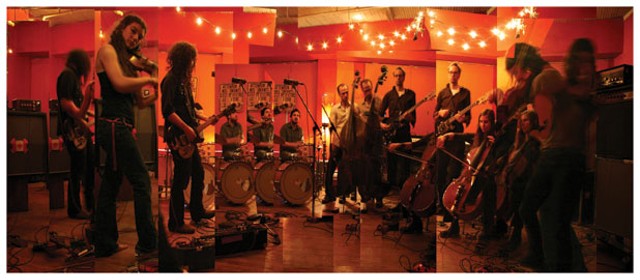Published May 14, 2008 at 10:23 a.m.
The members of Montréal's Thee Silver Mt. Zion Memorial Orchestra & Tra-La-La Band hold passionate social and political beliefs, reflected by an equally passionate international fan base. However, their music itself is rarely explicitly political, which leads to inevitable misconceptions about TSMZ's motives and inaccurate designations as a "political" band. Thanks, Pitchfork!
Seven Days recently spoke with TSMZ co-founder Efrim Menuck about politics, misunderstandings and a certain ad for the TV show "Lost," in advance of their upcoming Burlington performance.
A full transcript of this interview can be found online at Seven Days music blog Solid State.
SEVEN DAYS: TSMZ is often tabbed a "political" band. But that seems to be a designation you bristle at.
EFRIM MENUCK: For the most part we get broadly cast as a political band or anarchists or openly idealistic. There are all sorts of generalizations made about us, and I think that's what I bristle at. We don't conceive of ourselves as activists or political. We just think of ourselves as formed, grown-up human beings who choose to write songs that sort of address the mess that the world is in. There aren't any statements we've made that are contentious or anything. They all seem to be plainly held truths by most people. I don't know why people feel the need to characterize us as "political anarchists" or anything. But it's really far from the truth.
It's frustrating too. There was a time - I mean, it seems like forever ago now - when, like a lot of people, we were sort of on the margins of the antiglobalization movement and going to protests and stuff like that. There's a level of politicization that happens in that context that we were definitely a part of. There were references made in songs, specifically about those types of movements.
It's frustrating at points, too, because there are a lot of people [for whom] that whole milieu is alien to them. You're trying to write songs that are kind of nuanced, but it's kind of specific. It can be frustrating feeling like you have to give someone a sort of, like, "International Protest Movement for Beginners" spiel or something.
SD: You're often pointed to as the "leader" of the band, but that's not entirely true. It's more of a collective process, isn't it?
EM: It is absolutely a collective process. We'll start with a handful of riffs . . . there's very few songs where I'll come in with chords or lyrics ready, you know? There's maybe three songs like that in the history of the band. But for the most part, we'll start with a handful of riffs until some sort of rough structure is there. Then we'll start adding counter-lines and melodies and things. Then, really late in the process, I'll start writing words and sort of roughing them into the song. It takes us about a month of serious work to get a song together, because we're all stubborn and have this strange writing process.
SD: And they're all pretty epic songs. Like, 10-plus minutes.
EM: We've tried to write shorter songs. I guess it's maybe not a strong point for us. We sort of need that much runway. We're self-conscious about it, so we try to make it as concise as we can.
SD: Not to get political again, but have you been following the U.S. presidential election campaign?
EM: Yes, I have. Mostly, though, because it's ridiculous theater at this point. It's, like, evidence of everything that's wrong not just with your political system, but with political systems of all the wealthy, industrialized nations. It's like watching a train wreck.
There's no truth there, the way it's spoken about. The way arguments are contextualized and framed, it's clear that it's the cable news networks that are running the show. They have a vested interest in continuing specific narratives and they'll just spin things however they want to.
It's frustrating, and I can imagine it's even more frustrating for an American. Somewhere there's some sort of policy discussion going on. But you'd be hard-pressed to find it.
SD: I promised a friend that I'd ask you about how "Tho You Are Gone I Still Often Walk W/You" came to be used in an ad for the ABC show "Lost."
EM: Every year we get offers to license music for movies, television shows and advertisements and we say, "No, no, no, no, no." We turn down, like, tens of thousands of dollars every year because it's either a piece of a song that we really have an attachment to, or that we know other people have an attachment to. Or what they want to license it for is something that we just find heinous or boring. And so this "Lost" thing came in, and there's some people in the band who watch that show. And also, it's a little 10-second chunk of a song that none of us feels any attachment to.
We talk to people after shows - we're an open band that way. And in all of the touring we've done, no one, no one, has ever brought up that song as something they've liked or was important to them . . .
It's been interesting, because our engagement with the music industry has always been incredibly pragmatic. We try not to fuck people over and we take every decision that we make very seriously and we don't grab at the easy, quick money, ever.
What it comes down to is that it was a perfect storm of mitigating factors. It was ultimately a pretty easy decision to make and a pretty easy decision to justify.
More By This Author
Speaking of Music, musician Profile
-

Two Local Band Directors March in the Macy's Parade
Nov 22, 2023 -

Before a Burlington Show, the Wood Brothers Get Back to Basics
Oct 26, 2023 -

After a Half-Century of Leading Local Ensembles, Steven and Kathy Light Prepare a Musical Farewell
May 3, 2023 -

Double E 2023 Summer Concert Series Kicks Off With the Wailers
Mar 17, 2023 -

UVM’s New School of the Arts Gathers Many Creative Disciplines Under One Roof
Sep 14, 2022 - More »
Comments
Comments are closed.
From 2014-2020, Seven Days allowed readers to comment on all stories posted on our website. While we've appreciated the suggestions and insights, right now Seven Days is prioritizing our core mission — producing high-quality, responsible local journalism — over moderating online debates between readers.
To criticize, correct or praise our reporting, please send us a letter to the editor or send us a tip. We’ll check it out and report the results.
Online comments may return when we have better tech tools for managing them. Thanks for reading.















































